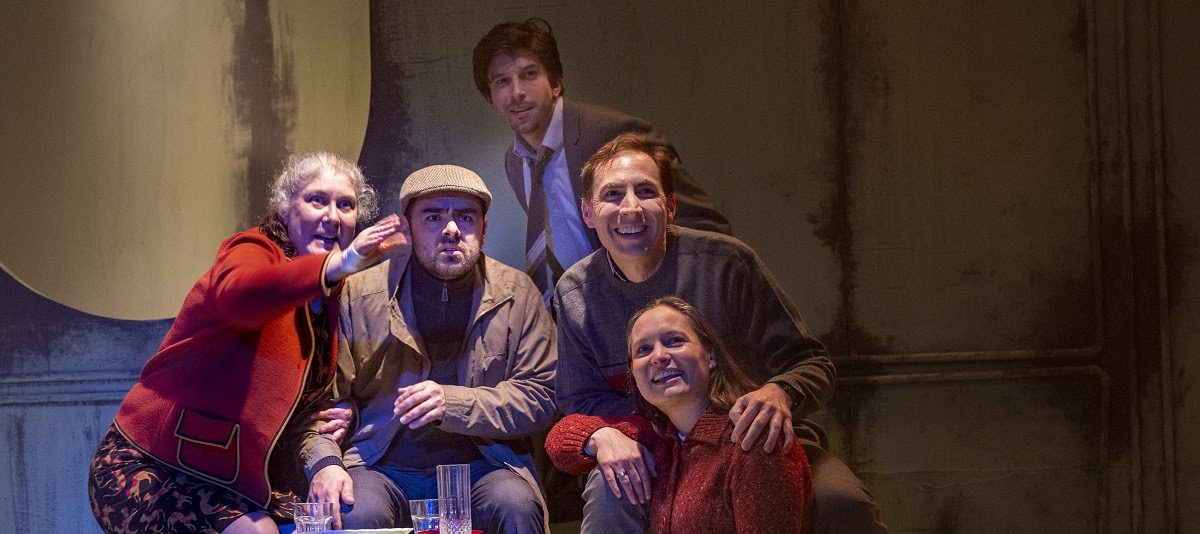A play about a largely forgotten diplomatic drama springs to life at the New Theatre.
Telling the story of Russian intelligence agent Alexander Litvinenko and his death from radioactive poisoning in 2006 – allegedly authorized by Vladimir Putin – A Very Expensive Poison takes all the key elements of the fascinating true story and adapts it into a mashup of drama, comedy, musical, monologue, history lesson, and all-round absurd. Based on journalist Luke Harding’s novel of the same name, it’s not likely what you expect when signing up for a political drama about a true murder acknowledged across the world.
Written by Lucy Prebble, the play begins in Russia, with Marina Litvinenko (Chloe Schwank) revealing her pursuit of justice and begging for her truth to be known across the world. Next the audience is taken to a London hospital, where her husband Alexander Litvinenko (Richard Cox) is admitted. As the reality of Alexander’s condition becomes apparent, the play returns to Russia. The Litvinenko’s past, and the events that have led to the fateful day, are revealed, primarily bolstered by Alexander’s exposing of government corruption and his circle of strange individuals with questionable allegiances. It’s an interesting structure that allows Litvinenko to solve his murder before his death and give audiences the context to his poisoning.
The play is traditional for most of the first act, following tropes and narrative beats with plenty of exposition and lighthearted moments. That is, until an unexpected Fergie song starts playing, welcoming the more abstract and unusual components of the script to the stage. Shifting from traditional drama, moments of off-beat humour and the appearance of Vladimir Putin (Tasha O’Brien) allows for further exploration of the play’s key issues, though they are a bit on the nose and hit-and-miss in their impact.
Surrealism takes over the stage after the interval as the characters learn more about the figures involved. There is little reprieve from this surrealism until the play’s end, which returns to Alexander’s poisoning and the emotional impact of this on the Litvinenko’s relationship. Unfortunately, Prebble’s overly bizarre machinations dilute the message of Harding’s original story; they are quirky for the sake of it, with elements like self-referential and self-righteous monologues not allowing the actors to truly tell a story. Additional transcript readings also feel unnecessary.
Director Margaret Thanos does well with this huge story and script, wrangling it all together for the three-hour long spectacle and keeping it fresh and unexpected. Backed by a superb cast, all actors earn their spot on the stage and their performances are what keeps the interest alive. Within 16 performers taking on almost 50 characters between them, they move set objects quickly and speak in Russian accents where needed quite well. As an ensemble, they come together well and brilliantly walk the line between the differing genres and styles, while hurriedly representing their environments in trench coats or hospital attire.
Schwank is one of the bright stars, bringing genuine emotion to all her scenes and carrying the show with ease. It’s a complex role she takes on well; her Marina grounds the play as a proud yet distraught woman who finds her voice. Cox does well to bring life to Alexander as a calm and measured man, deeply flawed and idealistic, and ultimately humanises the man dying in the hospital bed shown in ages across the world. O’Brien plays Putin equally brilliantly, hamming up the comedy for laughs and speaking with such passion that you almost believe she is the Russian president, with his wicked asides and monologues. Her timing and comedy makes her a standout, and the performer that everyone was talking about post-show.
The set by Aloma Barnes is well designed, albeit bleak and simple. Arches, staggered stairs, and platforms act like the inside of a nuclear power plant or lab, while also lending themselves well to places like apartments, hospitals and party locales. Lighting by Paris is solid, as is the costume design choices. Thanos does well to utilize the entire set, except for an unusual entrance made through the lighting box at the back of the theatre.
In the end, A Very Expensive Poison says a lot and not much at all, pointing the finger at the audience for complacency without fully regarding the geopolitical situation of 2006, or that in which we find ourselves in 2023. Its excessive length and unnecessary inclusions take away from the strong key story at its core. It’s intriguing and bombastic, leaving one enraged and uncomfortable, without a solid payoff or message that we can work with. Luckily, for those seeking a clearer political statement and condemnation with a splash of humour, you’ve arrived at the right place and the right show.
